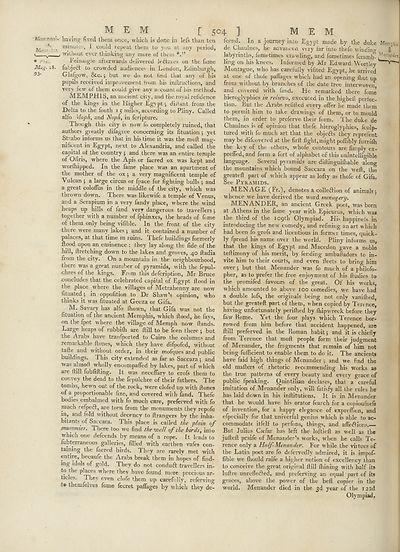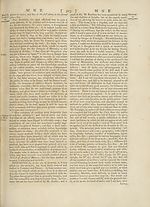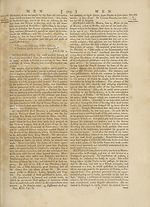Encyclopaedia Britannica, or, a Dictionary of arts, sciences, and miscellaneous literature : enlarged and improved. Illustrated with nearly six hundred engravings > Volume 13, MAT-MIC
(546) Page 504
Download files
Complete book:
Individual page:
Thumbnail gallery: Grid view | List view

’ Mnemoru-
JMug. 28.
93-
MEM [ 504 1 MEM
Iravlng fixed them once, which is done in lefs than ten
minute , I could repeat them to you at any period,
witnout ever thinking any more of them
f einaigte afterwards delivered lectures on the fame
fubject to crowded audiences in London, Edinburgh,
Glafgow, &e.; but we do not find that any of his
pupils received improvement from his imirudions, and
very few oi them could give anv account of his method.
MEMPHIS, an ancient city, and the royal reiidence
of the kings in the Higher Egypt; dhtant from the
Delta to the fouth 15 miles, according to Pliny. Called
alfo \loph, and Noph, in fcripture.
Though this city is now fo completely ruined, that
authors greatly difagree concerning its fituation *, yet
Strabo informs us that in his time it was the moll mag¬
nificent in Egypt, next to Alexandria, and called the
capital ot the country j and there was an entire temple
of Oliris, where the Apis or facred ox was kept and
worthipped. In the fame place was an apartment of
the mother of the ox j a very magnificent temple of
Vulcan 5 a large circus or fpace for fighting bulls ; and
a great cololfus in the middle of the city, which was
thrown down. There was likewife a temple of Venus,
and a Serapium in a very fandy place, where the wind
heaps up hills of fand very dangerous to travellers j
together with a number of fphinxes, the heads of fome
of them only being vifible. In the front of the city
there were many lakes; and it contained a number of
palaces, at that time in ruins. I hefe buildings formerly
flood upon an eminence : they lay along the fide of the
hill, ftretching down to the lakes and groves, 40 ftadia
from the city. On a mountain in the neighbourhood,
there was a great number of pyramids, with the fepul-
chres of the kings. From this defcription, Mr Bruce
concludes that the celebrated capital of Egypt flood in
the place where the villages of Metrahenny are now
fituated; in oppofition to Dr Shaw’s opinion, who
thinks it was fituated at Geeza or Gifa.
M. Savary has alfo fhown, that Gifa was not the
fituation of the ancient Memphis, which flood, he fays,
on the fpot where the village of Memph now Hands.
Large heaps of rubbifh are flill to be feen there 5 but
the Arabs have tranfported to Cairo the columns and
remarkable flones, which they have difpofed, without
tafle and without order, in their mofques and public
buildings. I his city extended as far as Saccara 5 and
was almofl wholly encompaffed by lakes, part of which
are flill fubfifling. It was neceflarv to crofs them to
convey the dead to the fepulchre of their fathers. The
tombs, hewn out of the rock, Avere clofed up with flones
of a proportionable fize, and covered with fand. Thefe
bodies embalmed with fo much care, preferved with fo
much > efpedf, are torn from the monuments they repofe
in, and fold without decency to flrangers by the inha¬
bitants of Saccara. This place is called the plain of
mummies. There too we find the well of the birds, into
which one defcends by means of a rope. It leads to
fubterraneous galleries, filled Avith earthen vafes con¬
taining the facred birds. They are rarely met with
entire, becaufe the Arabs break them m hopes of find¬
ing idols of gold. They do not condufl travellers in¬
to the places where they have found more precious ar¬
ticles. They even elofe them up carefully, referving
t® themfelves fome fecret paffages by which they de-
fcend. In a journey into Egypt made by the duke
de Chaulnes, he advanced very tar into thefe windino-
labyrinth*, fometimes crawling, and fometimes fcramb-
ling on his knees. Informed by Mr EdAvard Wortley
Montague, who has carefully vilited Egypt, he arrived
at one of thole paffages which had an opening Ihut up
from Avithout by branches of the date tree interwoven
and covered Avith fand. He remarked there fome
hieroglyphics in relievo, executed in the highefl perfec¬
tion. But the Arabs refilled every offer he made them
to permit him to take drawings of them, or to mould
them, in order to preferve their form. The duke de
Chaulnes is of opinion that thefe hieroglyphics, fculp-
tured with fo much art that the objects they reprefent
may be difcovered at the firfl fight, might poflibly furnifh
the key of the others, Avhofe contours are limply ex-
preffed, and form a fort of alphabet of this unintelligible
language. . Several pyramids are diflinguifhable along
the mountains Avhich bound Saccara on the weft, the
greateft part of Avhich appear as lofty as thofe of Gifa.
See Pyramids.
MENAGE (Fr.), denotes a colledlion of animals j
whence avc have derived the Avoid tnenagery.
MENANDER, an ancient Greek poet, Avas born
at Athens in the fame year with Epicurus, which Ava*
the third of the 109th Olympiad. His happinels in
introducing the new comedy, and refining an art which
had been fo grofs and licentious in former times, quick¬
ly fpread his name over the Avorld. Pliny informs us,
that the kings of Egypt and Macedon gave a noble
teftimony of his merit, by fending ambafiadors to in¬
vite him to their courts, and even fleets to bring him
over; but that Menander Avas fo much of a philofo-
pher, as to prefer the free enjoyment of his ftudies to
the promifed favours of the great. Of his Avorks,
which amounted to above 100 comedies, we have had
a double lofs, the originals being not only vanifhed,
but the greateft part of them, A\hen copied by Terence,
having unfortunately perifhed by fhipAvreck before they
faw Rome. Yet the four plays Avhich Terence bor¬
rowed from him before that accident happened, are
ftill preferved in the Roman habit; and it is chiefly
from Terence that moft people form their judgment
of Menander, the fragments that remain of him not
being fufficient to enable them to do it. The ancients
have faid high things of Menander ; and we find the
old mailers of rhetoric recr.mmending his works as
the true patterns of every beauty and every grace of
public fpeaking. Quintilian declares, that a careful
imitation of Menander only, will fatisfy all the rules he
has laid down in his inftitutions. It is in Menander
that he would have his orator fearch for a copioulnefs
of invention, for a happy elegance of expreffion, and
especially for that univerfal genius which is able to ac¬
commodate itfelf to perfons, things, and aftedlions.—
But Julius Caefar has left the loftieft as well as the
jufteft praife of Menander’s works, when he calls Te¬
rence only a Half Menander. For while the virtues of
the Latin poet are fo defervedly admired, it is impof-
fible we fhould raife a higher notion of excellency than
to conceive the great original ftill fhining with half its
luftre unrefledled, and preferving an equal part of its
graces, above the power of the beft copier in the
world. Menander died in the 3d year of the 122d
Olympiad,
Men-ptik
n, 11 5
MenarderJ
JMug. 28.
93-
MEM [ 504 1 MEM
Iravlng fixed them once, which is done in lefs than ten
minute , I could repeat them to you at any period,
witnout ever thinking any more of them
f einaigte afterwards delivered lectures on the fame
fubject to crowded audiences in London, Edinburgh,
Glafgow, &e.; but we do not find that any of his
pupils received improvement from his imirudions, and
very few oi them could give anv account of his method.
MEMPHIS, an ancient city, and the royal reiidence
of the kings in the Higher Egypt; dhtant from the
Delta to the fouth 15 miles, according to Pliny. Called
alfo \loph, and Noph, in fcripture.
Though this city is now fo completely ruined, that
authors greatly difagree concerning its fituation *, yet
Strabo informs us that in his time it was the moll mag¬
nificent in Egypt, next to Alexandria, and called the
capital ot the country j and there was an entire temple
of Oliris, where the Apis or facred ox was kept and
worthipped. In the fame place was an apartment of
the mother of the ox j a very magnificent temple of
Vulcan 5 a large circus or fpace for fighting bulls ; and
a great cololfus in the middle of the city, which was
thrown down. There was likewife a temple of Venus,
and a Serapium in a very fandy place, where the wind
heaps up hills of fand very dangerous to travellers j
together with a number of fphinxes, the heads of fome
of them only being vifible. In the front of the city
there were many lakes; and it contained a number of
palaces, at that time in ruins. I hefe buildings formerly
flood upon an eminence : they lay along the fide of the
hill, ftretching down to the lakes and groves, 40 ftadia
from the city. On a mountain in the neighbourhood,
there was a great number of pyramids, with the fepul-
chres of the kings. From this defcription, Mr Bruce
concludes that the celebrated capital of Egypt flood in
the place where the villages of Metrahenny are now
fituated; in oppofition to Dr Shaw’s opinion, who
thinks it was fituated at Geeza or Gifa.
M. Savary has alfo fhown, that Gifa was not the
fituation of the ancient Memphis, which flood, he fays,
on the fpot where the village of Memph now Hands.
Large heaps of rubbifh are flill to be feen there 5 but
the Arabs have tranfported to Cairo the columns and
remarkable flones, which they have difpofed, without
tafle and without order, in their mofques and public
buildings. I his city extended as far as Saccara 5 and
was almofl wholly encompaffed by lakes, part of which
are flill fubfifling. It was neceflarv to crofs them to
convey the dead to the fepulchre of their fathers. The
tombs, hewn out of the rock, Avere clofed up with flones
of a proportionable fize, and covered with fand. Thefe
bodies embalmed with fo much care, preferved with fo
much > efpedf, are torn from the monuments they repofe
in, and fold without decency to flrangers by the inha¬
bitants of Saccara. This place is called the plain of
mummies. There too we find the well of the birds, into
which one defcends by means of a rope. It leads to
fubterraneous galleries, filled Avith earthen vafes con¬
taining the facred birds. They are rarely met with
entire, becaufe the Arabs break them m hopes of find¬
ing idols of gold. They do not condufl travellers in¬
to the places where they have found more precious ar¬
ticles. They even elofe them up carefully, referving
t® themfelves fome fecret paffages by which they de-
fcend. In a journey into Egypt made by the duke
de Chaulnes, he advanced very tar into thefe windino-
labyrinth*, fometimes crawling, and fometimes fcramb-
ling on his knees. Informed by Mr EdAvard Wortley
Montague, who has carefully vilited Egypt, he arrived
at one of thole paffages which had an opening Ihut up
from Avithout by branches of the date tree interwoven
and covered Avith fand. He remarked there fome
hieroglyphics in relievo, executed in the highefl perfec¬
tion. But the Arabs refilled every offer he made them
to permit him to take drawings of them, or to mould
them, in order to preferve their form. The duke de
Chaulnes is of opinion that thefe hieroglyphics, fculp-
tured with fo much art that the objects they reprefent
may be difcovered at the firfl fight, might poflibly furnifh
the key of the others, Avhofe contours are limply ex-
preffed, and form a fort of alphabet of this unintelligible
language. . Several pyramids are diflinguifhable along
the mountains Avhich bound Saccara on the weft, the
greateft part of Avhich appear as lofty as thofe of Gifa.
See Pyramids.
MENAGE (Fr.), denotes a colledlion of animals j
whence avc have derived the Avoid tnenagery.
MENANDER, an ancient Greek poet, Avas born
at Athens in the fame year with Epicurus, which Ava*
the third of the 109th Olympiad. His happinels in
introducing the new comedy, and refining an art which
had been fo grofs and licentious in former times, quick¬
ly fpread his name over the Avorld. Pliny informs us,
that the kings of Egypt and Macedon gave a noble
teftimony of his merit, by fending ambafiadors to in¬
vite him to their courts, and even fleets to bring him
over; but that Menander Avas fo much of a philofo-
pher, as to prefer the free enjoyment of his ftudies to
the promifed favours of the great. Of his Avorks,
which amounted to above 100 comedies, we have had
a double lofs, the originals being not only vanifhed,
but the greateft part of them, A\hen copied by Terence,
having unfortunately perifhed by fhipAvreck before they
faw Rome. Yet the four plays Avhich Terence bor¬
rowed from him before that accident happened, are
ftill preferved in the Roman habit; and it is chiefly
from Terence that moft people form their judgment
of Menander, the fragments that remain of him not
being fufficient to enable them to do it. The ancients
have faid high things of Menander ; and we find the
old mailers of rhetoric recr.mmending his works as
the true patterns of every beauty and every grace of
public fpeaking. Quintilian declares, that a careful
imitation of Menander only, will fatisfy all the rules he
has laid down in his inftitutions. It is in Menander
that he would have his orator fearch for a copioulnefs
of invention, for a happy elegance of expreffion, and
especially for that univerfal genius which is able to ac¬
commodate itfelf to perfons, things, and aftedlions.—
But Julius Caefar has left the loftieft as well as the
jufteft praife of Menander’s works, when he calls Te¬
rence only a Half Menander. For while the virtues of
the Latin poet are fo defervedly admired, it is impof-
fible we fhould raife a higher notion of excellency than
to conceive the great original ftill fhining with half its
luftre unrefledled, and preferving an equal part of its
graces, above the power of the beft copier in the
world. Menander died in the 3d year of the 122d
Olympiad,
Men-ptik
n, 11 5
MenarderJ
Set display mode to:
![]() Universal Viewer |
Universal Viewer | ![]() Mirador |
Large image | Transcription
Mirador |
Large image | Transcription
Images and transcriptions on this page, including medium image downloads, may be used under the Creative Commons Attribution 4.0 International Licence unless otherwise stated. ![]()
| Permanent URL | https://digital.nls.uk/192668260 |
|---|
| Attribution and copyright: |
|
|---|
| Description | Ten editions of 'Encyclopaedia Britannica', issued from 1768-1903, in 231 volumes. Originally issued in 100 weekly parts (3 volumes) between 1768 and 1771 by publishers: Colin Macfarquhar and Andrew Bell (Edinburgh); editor: William Smellie: engraver: Andrew Bell. Expanded editions in the 19th century featured more volumes and contributions from leading experts in their fields. Managed and published in Edinburgh up to the 9th edition (25 volumes, from 1875-1889); the 10th edition (1902-1903) re-issued the 9th edition, with 11 supplementary volumes. |
|---|---|
| Additional NLS resources: |
|

